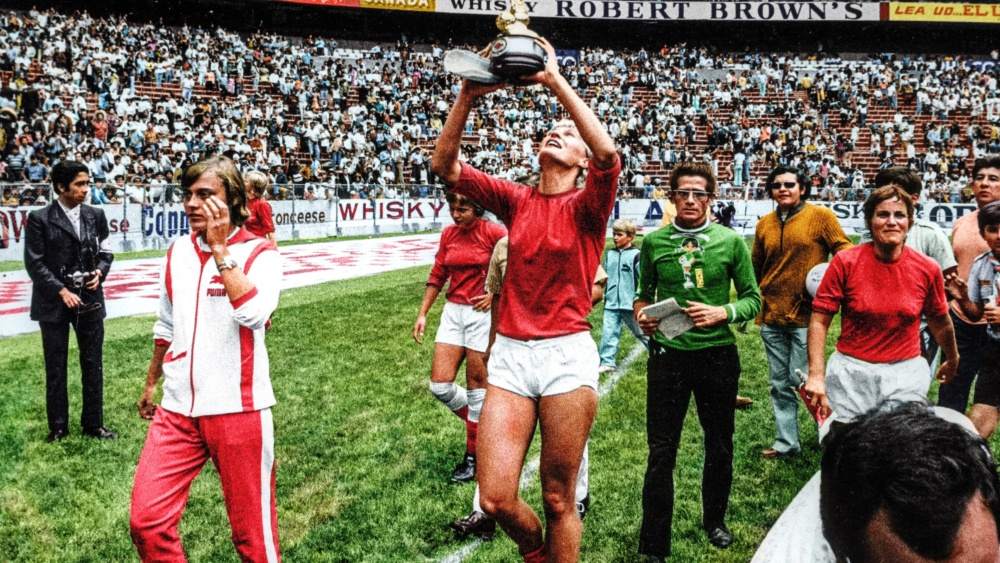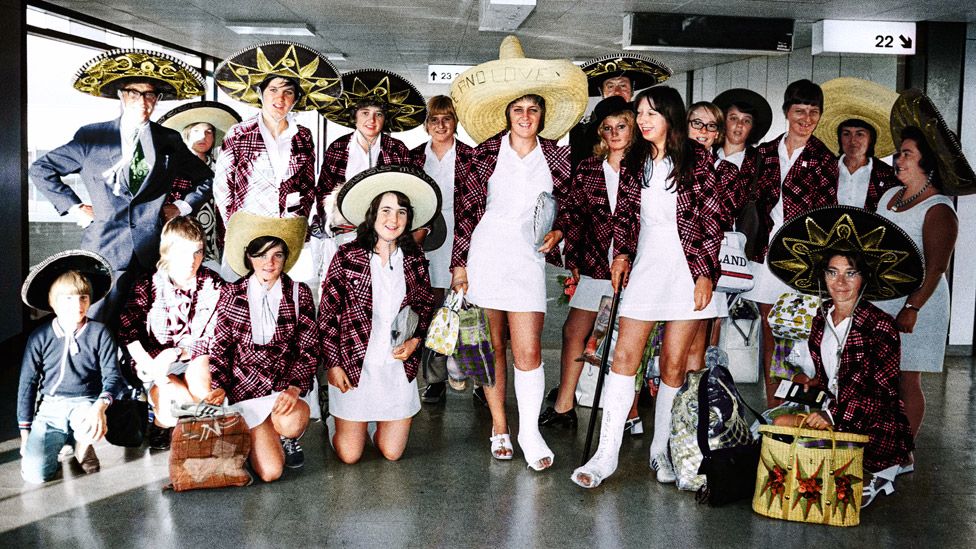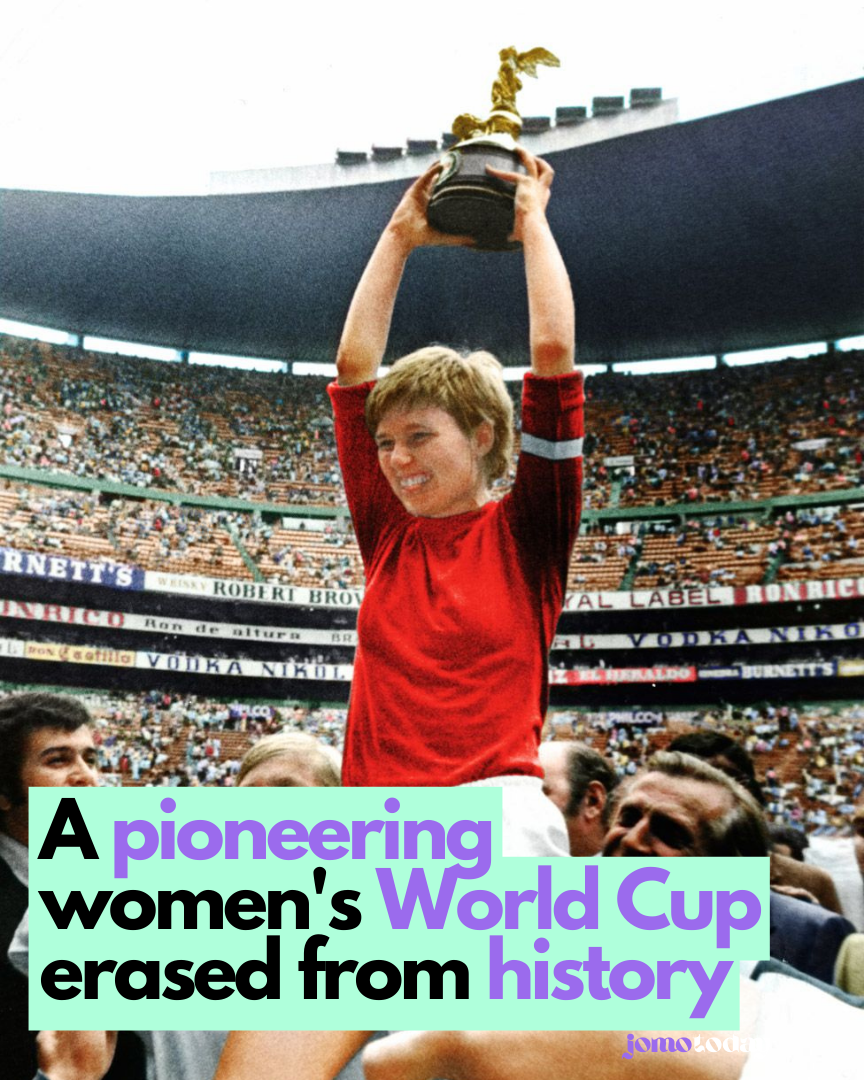A groundbreaking women’s World Cup from 1971, with record-breaking attendance, is highlighted in a new documentary supported by the Williams sisters, revealing a significant event in women’s sports history.

The story of huge crowds at the 1971 event is told in a new documentary backed by the Williams sisters.
Upon arriving in Mexico, English players found themselves “thrust into an alternate reality,” reminisces Captain Carol Wilson. Accustomed to facing obstacles, neglect, and derision in their homeland, female footballers were accustomed to playing on park fields with only a few spectators. The Football Association had just lifted a 50-year ban on the women’s game. Consequently, the players were taken aback by the warm reception they received in the host country of the tournament.
Hundreds of Mexican fans eagerly awaited their arrival, accompanied by photographers whose flashlights dazzled them upon disembarking the plane, an experience that persisted throughout their entire five-week stay.
Treated as superstars, they found crowds seeking autographs, camping outside their hotel, and swarming their team coach.
“The public embraced us wholeheartedly,” Wilson reflects. “They trailed us everywhere we went, showing us unparalleled warmth and hospitality. It’s difficult to convey in words the depth of that reception.”
In 2019, the BBC covered the saga of England’s “Lost Lionesses,” a tale now further explored in the documentary Copa 71. The film opens with narration by tennis icon Serena Williams, who, along with her sister Venus, serves as an executive producer. Renowned for their athletic prowess and commitment to activism, the Williams sisters are deeply invested in spotlighting narratives that enrich our comprehension of women’s sports history, as emphasized by the film’s co-director Rachel Ramsay.
Ramsay articulates the documentary’s portrayal of an alternate reality, one where women’s football wasn’t suppressed: “As we delved into the story and engaged with the women involved, it became evident that they possess profound insights, their voices stifled for half a century.”
Women from various countries share similar experiences of being told that football was not meant for them. Therefore, the Mexico tournament’s provision of equality and recognition holds special significance for them. While official attendance figures are unavailable, approximations indicate that over 100,000 spectators watched the final, potentially marking it as the most widely attended women’s sporting event in history.
Paradoxically, the tournament’s triumph can be attributed to Fifa’s attempt to obstruct it. According to the documentary, Fifa’s prohibition compelled organizers to secure stadiums beyond the control of the Mexican football federation. Consequently, the matches took place in the nation’s largest venues, overseen by the dominant media conglomerate, which vigorously advertised the event to boost ticket sales.
The tournament’s matches were broadcast live on Mexican television. Ramsay and her team have managed to locate and retrieve footage of these matches, unseen for over half a century, along with home videos captured by fans.
She mentions that the outcome differs from typical sports documentaries. Firstly, there’s no specific team or player for viewers to support. Secondly, the focus is on women.
“There’s an abundance of films, series, and literature dedicated to men’s tournaments, matches, achievements, and players, often revisited,” Ramsay observes.
“We envision this film sparking a new wave of women’s sports documentaries. Initially, finding comparable works, especially those centering on women in their 70s, was challenging.
Convincing others to feature these women and their narrative was often met with resistance,” Ramsay reflects, “but it was non-negotiable for me.”
“I encountered skepticism about creating a sports film without a clear winner to champion,” Ramsay recalls. “However, I believed in the tournament itself as the ultimate victor, highlighting the collective experience of these women.”
“We challenged the traditional sports documentary formula, refusing to adhere to a standard template,” Ramsay asserts. “It was crucial for us to tell stories in unconventional ways, breaking away from the expected mold of sports films.”
After the tournament concluded, however, the participants were brought back to reality abruptly.
The manager of the English team, Harry Batt, found himself blacklisted by the emerging Women’s Football Association as they were assembling the inaugural England team. Alongside him, certain players faced bans as well.

According to the documentary, the success and popularity of women’s football demonstrated during Mexico 1971 posed a threat to the established male-dominated football authorities. Despite its potential, this historical event was largely forgotten, buried under the weight of male football dominance for decades.
Ramsay explains that the women involved, particularly those from the England team, rarely discussed the experience. Upon returning from the tournament, they held a belief that women’s football had secured a lasting place in the sports landscape. However, this optimism was abruptly shattered, leaving them to grapple with feelings of trauma, disappointment, and societal neglect.
The documentary suggests that the international and national football associations struggled to reconcile the success of a groundbreaking women’s football tournament with their established narrative. There seemed to be a prevailing sentiment that women’s participation in the same sport might diminish the prominence of men’s football. Only recently have efforts begun to rectify this imbalance, with the women’s game experiencing remarkable growth in recent years. However, there is still ground to cover in bridging the gap between men’s and women’s football.
The documentary received enthusiastic praise following its debut at the previous year’s Toronto Film Festival. Fionnuala Hannigan from Screen International hailed it as “a crowd-pleaser, reminiscent of those record-breaking matches”.
Daniel Fienberg of The Hollywood Reporter described it as unveiling a previously obscured chapter in history and shining a well-deserved spotlight on its heroes. He expressed being moved to tears several times, noting the palpable sense that these stories had awaited an outlet for decades.
For Wilson, viewing the film evoked strong emotions, transporting her back to 1971 and making her feel as if she were reliving those moments.
Recent World Cups and Euros have begun to realize the potential of women’s football, yet Wilson reflects that progress could have been achieved much earlier.
Chris Lockwood, another English player, shared Wilson’s sentiment, expressing joy at seeing the film and the memories it evoked, albeit tinged with sadness. He acknowledged the sorrow surrounding Harry’s lifetime ban and the previously concealed nature of the story.
“But not anymore,” he added.
It’s incredible to think about the talent and determination of these female athletes, yet their achievements seem to have been swept under the rug. Back in [year], the world witnessed an amazing display of women’s soccer talent, as teams from around the globe battled it out for the championship title. However, despite the incredible efforts of these athletes, the tournament seems to have faded into obscurity.
It’s important to recognize and celebrate the groundbreaking accomplishments of these trailblazing women who paved the way for the future of women’s soccer. The time has come to bring their stories back into the limelight and give them the recognition they truly deserve. Stay tuned as we dive deeper into the forgotten pioneers of the women’s World Cup!
Read More: Matthew Slater retires
Disclaimer:
This content is AI-generated using IFTTT AI Content Creator. While we strive for accuracy, it’s a tool for rapid updates. We’re committed to filtering information, not reproducing or endorsing misinformation. – Jomotoday for more information visit privacy policy






Leave a Comment